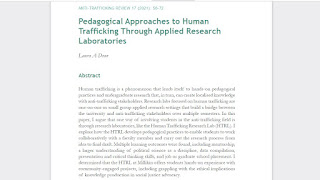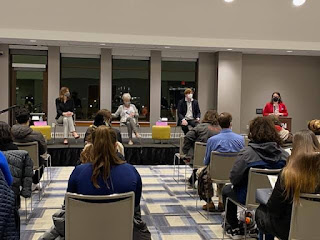Article Published in Anti-Trafficking Review Issue 17 on Anti-Trafficking Education
I was inspired to write an article about my experience working with students in the Human Trafficking Research Lab for the latest issue of Anti-trafficking Review on Anti-Trafficking Education and the article entitled "Pedagogical Approaches to Human Trafficking Through Applied Research Laboratories" was finally published (after four rounds of revisions) in September 2021.
In the article I argue that human trafficking is a phenomenon that lends itself to hands-on pedagogical practices and undergraduate research that, in turn, can create localised knowledge with anti-trafficking stakeholders. Research labs focused on human trafficking are one-on-one or small group applied research settings that build a bridge between the university and anti-trafficking stakeholders over multiple semesters. In this paper, I argue that one way of involving students in the anti-trafficking field is through research laboratories, like the Human Trafficking Research Lab (HTRL) at Millikin University. I explore how the HTRL develops pedagogical practices to enable students to work collaboratively with a faculty member and carry out the research process from idea to final draft. Multiple learning outcomes were found, including mentorship, a larger understanding of political science as a discipline, data compilation, presentation and critical thinking skills, and job or graduate school placement. I determined that the HTRL at Millikin offers students hands-on experience with community-engaged projects, including grappling with the ethical implications of knowledge production in social justice advocacy.You can read and download a copy of my article open access here.
The Global Alliance Against Traffic in Women (GAATW) that publishes Anti-Trafficking Review also published a video discussion of me talking about my article on their YouTube channel here.





Comments
Post a Comment